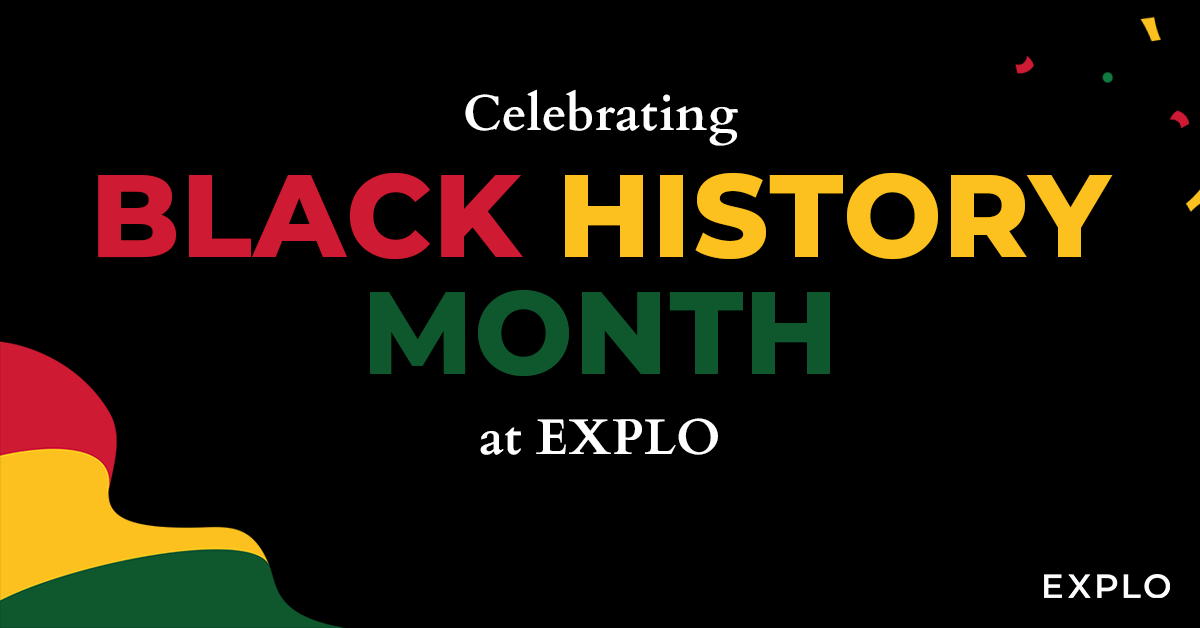5 Black Educators Who Have Shaped the Course of History

In honor of Black History Month, we’re putting the spotlight on five influential Black educators who used their brilliance and dedication to work toward more equitable and just education for Black students — and for all.
While they make up only a small part of the Black academic community and its history in the United States, we hope it inspires you, as it did us, to discover more about the dedicated educators who are making a difference.
Mary McLeod Bethune
Mary Jane McLeod Bethune, the daughter of former slaves, became one of the most influential Black educators, civil and women's rights leaders, and government officials of the twentieth century. Her work as an advisor to President Franklin D. Roosevelt provided Black Americans a voice in government, and the school she founded, which became Bethune-Cookman College, set educational standards for today's Black colleges.
Dr. Bethune started the Daytona Literary and Industrial Training Institute for Negro Girls on October 3, 1904, with $1.50 and a dream. Recognizing the health inequities and lack of medical treatment available to Black Americans in Daytona Beach, she also established the Mary McLeod Hospital and Training Institution for Nurses, which was the only school of its kind on the east coast at the time.
After women were granted the right to vote in 1920, Dr. Bethune organized a number of organizations and conducted voter registration drives — all while facing the risk of racist attacks. She was elected president of the National Association of Colored Women's Clubs in 1924, and she became the founding president of the National Council of Negro Women in 1935, a highly influential civil rights organization. During the Great Depression, Bethune was also instrumental in the shift of Black voters from the Republican Party to the Democratic Party. Bethune became the highest-ranking African American woman in government in 1936, when President Franklin D. Roosevelt nominated her director of Negro Affairs of the National Youth Administration, a position she held until 1944.
Dr. Bethune hosted a conference on the Problems of the Negro and Negro Youth in 1937 and pushed to eradicate discrimination and lynching. She was also a leader of FDR's unofficial "Black cabinet." She was elected vice president of the National Association for the Advancement of Colored Persons (NAACP) in 1940 and served in that capacity for the remainder of her life. Bethune ensured that the Women's Army Corps was racially integrated as a member of the advisory council that founded it in 1942. Bethune was the only woman of color at the United Nations' founding conference in 1945, having been appointed by President Harry S. Truman. She was also a regular contributor to the Pittsburgh Courier and the Chicago Defender, two of the nation's premier African-American publications.
Mary Bethune’s life was celebrated with a memorial statue in Washington DC in 1974, and a postage stamp in 1985. Her home is a National Historic Site, and in 2021, she became the first Black American to represent a state in the National Statuary Hall in the US Capitoll.
Kelly Miller
Kelly Miller was the first Black student admitted to Johns Hopkins University and the first Black mathematics graduate student in 1901. Since Johns Hopkins’ tuition increase pushed Miller out, he enrolled at Howard University to complete his graduate studies, where he taught for several years. He also earned an LL.B from Howard University Law School in 1803. Miller believed that Black Americans “required wise leadership in the difficult political and social circumstances following the defeat of Reconstruction, and only higher education could provide such leaders.”
Miller helped to found the first organization for Black intellectuals, the American Negro Academy, in 1897. He also helped organize Howard’s sociology department and served as a professor of sociology from 1895 to 1934. He became the Dean of the College of Arts and Science in 1907.
Over the next twelve years, Howard University’s enrollment skyrocketed thanks to Miller’s modernized curricula with new courses in the natural sciences and the social sciences. Miller also organized recruiting tours through the South and Mid-Atlantic United States — thanks to his efforts, enrollment increased from 75 undergraduates in 1907 to 243 undergraduates in just four years.
Miller assisted W.E.B. DuBois in editing The Crisis, the National Association for the Advancement of Colored People's (NAACP) magazine, in addition to writing several lectures and pamphlets about Black Americans' systemic discrimination. In the 1920s and 30s, he wrote weekly columns for more than 100 newspapers, and his theories were published in various books, including Race Adjustment (1908), Out of the House of Bondage (1914), and The Everlasting Stain (1924).
After more than fifty years at Howard University — teaching, learning, and leading — Miller retired in 1931. He passed away on December 29, 1939. He was 76 years old.
Inez Beverly Prosser
Inez Beverly Prosser was passionate about education since she was a child. Since Prosser’s family could only afford to send one of their children to college, they intended to send her older brother, Leon. However, Leon persuaded his parents to pay for Inez’s education instead. Her ultimate career as a professor allowed her to fund five of her siblings’ educations.
Prosser studied at Prairie View A&M University, a historically Black college northwest of Houston. She began teaching in Austin, Texas, in 1913, first at a Black elementary school and then at a high school. In 1926, she graduated from Samuel Huston College in Austin with a bachelor's degree. However, Prosser was forced to leave Texas for graduate school due to segregated schooling. In 1933, she earned her Master's in Psychology from the University of Colorado. Her thesis, titled "The Comparative Reliability of Objective Tests in English Grammar," examined the reliability of four different English grammar tests that she herself had created.
She went on to earn her Doctorate in Psychology from the University of Cincinnati. Prosser’s dissertation, "Non-academic development of negro children in mixed and segregated schools," which she completed in 1933, examined personality differences in Black children attending segregated and integrated schools. She concluded that Black children were better served in segregated schools. This research was one of several studies in the 1920s and 30s that was part of the debate on segregated schools as maintained in the United States under the “separate but equal” doctrine of Plessy v. Ferguson in 1896. Despite the support of some prominent figures such as Carter Woodson and W.E.B. DuBois, who reluctantly endorsed segregated schools until prejudicial attitudes of white teachers were sufficiently changed to provide an equitable experience for Black children, her findings were controversial.
Prosser was among the first group of Black women who obtained doctoral dissertations — and she was the first to earn a Doctorate in Psychology. Her presence on the cover of The Crisis in August 1933 celebrated the importance of her achievement.
In September, 1934, on her way to Mississippi after visiting family in Texas, she was killed in a car accident in Louisianna. She was just 38 years old.
Dr. Edmund Gordon
Edmund W. Gordon Edmund W. Gordon is a child development expert and psychologist who has spent his career focusing on the complex challenges faced by impoverished and minority children in American schools.
Dr. Gordon was commissioned by President Lyndon B. Johnson to help design the Head Start Program in 1956. Head Start provided early childhood education and family services to low-income families. For six months, Dr. Gordon worked with his mentor and friend, W.E.B. DuBois, to establish a program that would serve nearly half a million children.
Gordon graduated from Howard University with bachelor's degrees in zoology and social ethics, a Master's in Social Psychology from American University, and a Doctorate in Child Development and Guidance from Teachers College, Columbia University. He worked as a clinical psychologist and preacher before getting his PhD, following which he held professorial and departmental chair posts at Yeshiva University, Teachers College/Columbia University, and Yale University in the Psychology, Education, and/or Afro-American Studies departments.
He is currently an emeritus Richard March Hoe Professor of Psychology and Education at the Teachers College of Columbia University, an emeritus John M. Musser Professor of Psychology at Yale University, and an emeritus director of Teachers College's Institute for Urban and Minority Education (IUME). Gordon was also a consultant for the Educational Testing Service, several public school boards around the country, and the College Entrance Examination Board, where he developed and co-chaired the Taskforce on Minority High Achievement.
The Edmund W. Gordon papers, which date from 1957 to 1990, detail Gordon's work in government and academia — including Head Start, Columbia University Teachers College, and Yale University. The papers contain Gordon's and others' published and unpublished papers, book chapter drafts and manuscripts, Head Start program files, lectures and speeches, academic reports, and more. He authored and/or edited 15 books and 175 articles
Edmund turned 100 in 2021.
Septima Clark
The daughter of a former slave Septima Clark was a “community teacher, intuitive fighter for human rights and leader of her unlettered and disillusioned people.” She was known as the “Mother of the [grassroots citizenship education] Movement.” Clark taught throughout the state of South Carolina for more than 30 years and was a published writer twice over.
During summer breaks, Clark underwent her own schooling. She studied under W. E. B. Du Bois at Atlanta University before eventually earning her Bachelor of Arts from Benedict College in Columbia, and her Master of Arts from Virginia’s Hampton Institute. She also worked with the YWCA and was a participant in a class action case brought by the National Association for the Advancement of Colored People (NAACP) in South Carolina that resulted in pay equity for Black teachers. South Carolina passed a law prohibiting city and state employees from joining civil rights organizations in 1956 — and Clark's contract was not renewed because she refused to quit the NAACP. She had taught for 40 years.
Fortunately, Clark had already begun to run summer workshops at the Highlander Folk School in Monteagle, Tennessee, a social-justice centric grassroots education center founded by Myles Horton. The famous Rosa Parks participated in one of Clark’s workshops mere months before the Montgomery bus boycott.
Horton soon hired Clark as the Highlander’s director of workshops. Clark taught workshop participants about their rights and duties as US citizens, how to fill out voter registration forms, and more.
The state of Tennessee forced the Highlander Folk School to close in 1961. Thereafter, the Southern Christian Leadership Conference (SCLC) established the Citizenship Education Program (CEP), based on Clark’s workshops — and Clark became its director of education and teaching.
After she left the SCLC in 1970, Clark continued to run workshops for the American Field Service. Five years later, she was elected to the Charleston School Board. The following year, the governor of South Carolina reinstated her teacher’s pension after declaring that her termination in 1956 was unjust. In 1979, Clark was granted a Living Legacy Award by President Jimmy Carter.
Did you know of these educators already? Which other Black educators have made a monumental impact on the industry (and the world)? Let us know by emailing us at summer@explo.org!



